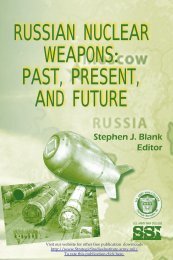The United States and China in Power Transition - Strategic Studies ...
The United States and China in Power Transition - Strategic Studies ...
The United States and China in Power Transition - Strategic Studies ...
Create successful ePaper yourself
Turn your PDF publications into a flip-book with our unique Google optimized e-Paper software.
no substitute for the efforts to w<strong>in</strong> the hearts <strong>and</strong> souls<br />
of the people <strong>in</strong> those two regions. Political reform is<br />
eventually <strong>in</strong> order. 220 In this respect, <strong>Ch<strong>in</strong>a</strong> should<br />
welcome U.S. assistance rather than reject<strong>in</strong>g it.<br />
<strong>The</strong> <strong>United</strong> <strong>States</strong> needs to take two th<strong>in</strong>gs <strong>in</strong>to account.<br />
One is to hold a f<strong>in</strong>e l<strong>in</strong>e between concern for<br />
human rights violations <strong>and</strong> support for separatists<br />
movements. <strong>The</strong> other is to take an unassum<strong>in</strong>g approach<br />
to work with the Ch<strong>in</strong>ese government on the<br />
human rights issues. <strong>The</strong> Australian experience with<br />
the Ch<strong>in</strong>ese government can be useful. 221<br />
On <strong>Ch<strong>in</strong>a</strong>’s Military <strong>Power</strong>. Of all the exp<strong>and</strong><strong>in</strong>g elements<br />
of <strong>Ch<strong>in</strong>a</strong>’s comprehensive national power, none<br />
is more of concern to the <strong>United</strong> <strong>States</strong> than <strong>Ch<strong>in</strong>a</strong>’s<br />
military power. Will <strong>Ch<strong>in</strong>a</strong>’s military power catch up<br />
with that of the <strong>United</strong> <strong>States</strong>? What should <strong>Ch<strong>in</strong>a</strong> <strong>and</strong><br />
the <strong>United</strong> <strong>States</strong> do <strong>in</strong> a peer competition, if not collision,<br />
of these two mighty military mach<strong>in</strong>es?<br />
<strong>The</strong> answer to the first question is straightforward.<br />
<strong>Ch<strong>in</strong>a</strong> has the capacity for its military to become a<br />
peer competitor to the U.S. military. All <strong>Ch<strong>in</strong>a</strong> needs<br />
are motivation, smart policies, resources, <strong>and</strong> time to<br />
br<strong>in</strong>g about its military’s potentials. <strong>The</strong> <strong>United</strong> <strong>States</strong><br />
<strong>in</strong>advertently provided <strong>Ch<strong>in</strong>a</strong> with the motivations<br />
<strong>in</strong> the 1990s. One was a wakeup call to the Ch<strong>in</strong>ese<br />
with the U.S.-led revolution <strong>in</strong> military affairs (RMA),<br />
which gave rise to an <strong>in</strong>novative fight<strong>in</strong>g power that<br />
was put on a full play dur<strong>in</strong>g the Gulf War I of 1991<br />
aga<strong>in</strong>st Saddam Husse<strong>in</strong>’s <strong>in</strong>vasion of Kuwait <strong>and</strong> the<br />
Kosovo air campaign of 1999. Ch<strong>in</strong>ese leaders were<br />
shocked to see how much the U.S. military power had<br />
advanced. <strong>The</strong>y had long regretted that <strong>Ch<strong>in</strong>a</strong> missed<br />
several RMA’s <strong>in</strong> the past (e.g., the transitions from<br />
“cold-weapon warfare” with the use of ma<strong>in</strong>ly knives<br />
to “hot-weapon warfare” with the application of fire-<br />
189

















